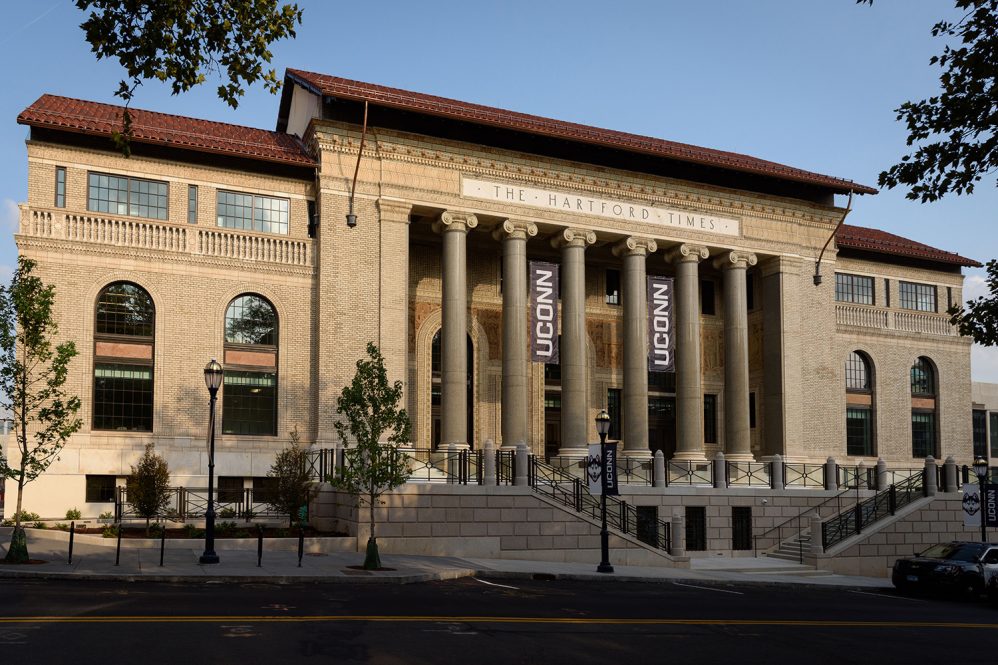UConn’s programs in public affairs and survey research were officially designated as the School of Public Policy in the College of Liberal Arts and Sciences on Wednesday. The change, which takes effect April 1, brings the program in line with its peers among the top programs of its kind in the country.
Formerly the Department of Public Policy, the School is dedicated to preparing graduate and undergraduate students for public leadership positions and producing applied research that solves societal problems.
“We have an amazing community of faculty, students, alumni, who are extremely engaged in our graduate programs, and who add plenty of value around the state,” says Mohamad Alkadry, professor of public policy and inaugural director of the new school. “This is a recognition of their contributions, and it motivates them to keep doing what they have been doing.”
The School’s interdisciplinary graduate professional degrees draw students from across the country, says Alkadry. Graduate programs and certificates focus on public administration, public policy, and survey research. According to U.S. News and World Report’s 2023 rankings, the program is ranked nationally in Public Affairs and Public Finance and Budgeting; the latter is 8th in the country. The Master of Public Administration program is celebrating its 50th anniversary next year.
The change signals UConn’s commitment to, and endorsement of, public service scholarship and education, and a serious commitment to serving the employment and research needs of the public and nonprofit sectors.
Based at the UConn downtown Hartford campus, near the heart of the state’s government, the School’s alumni go on to work in public and nonprofit sectors positions across Connecticut. The School’s graduate programs boast a 98 percent post-graduation placement rate, where graduates go on to make a living while making a difference in their communities.
“The impact that the students, alumni, and faculty of this program have on improving the lives of people in Connecticut is impressive,” says Dean of the College of Liberal Arts and Sciences Juli Wade. “They make key contributions to our state.”
The title change puts the program on equal footing with its peer schools regarding national reputation.
“To us, the change signals UConn’s commitment to, and endorsement of, public service scholarship and education, and a serious commitment to serving the employment and research needs of the public and nonprofit sectors,” says Alkadry.
Students in the Master of Public Administration and Master of Public Policy programs complete an internship in professional practice at a state or local institution or nonprofit organization. Despite the pandemic, in 2021-2022 the programs placed 73 students in year-long paid internships that benefit the public.
The programs’ outreach portfolio includes the Public Service Executive Leadership Collaborative (PSELC), a partnership with public and nonprofit organizations that organizes 8-10 day-long workshops for public policy practitioners annually. The Encore!Connecticut program also provides leadership training to private sector executives interested in nonprofit careers.
Faculty researchers provide scholarly and applied research to the State and the nation in areas of education policy, gun violence prevention, child and family policy, slavery reparations, gender equity, personnel, sustainable procurement, healthcare policy, energy policy, and racial and ethnic profiling.
As of 2021, the School also includes the Institute for Municipal and Regional Policy (IMRP), which provides evidence-based policy research in addition to supporting the Connecticut Sentencing Commission and Commission on Racial and Ethnic Disparity.
Overall, the change enhances UConn’s ability to recruit top public policy scholars and graduate students, says Alkadry. “Attracting top faculty and top students has always been our recipe for success.”
“This change further establishes us as a destination for public service education in the state and the region,” he says. “The grand plan is to keep doing, and improving on, what we have always done well.”



